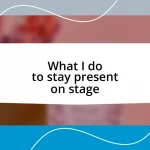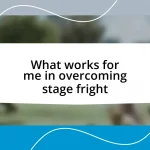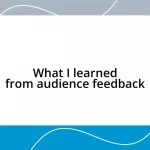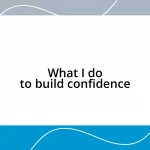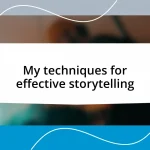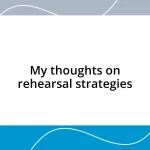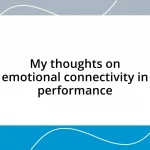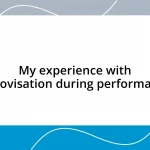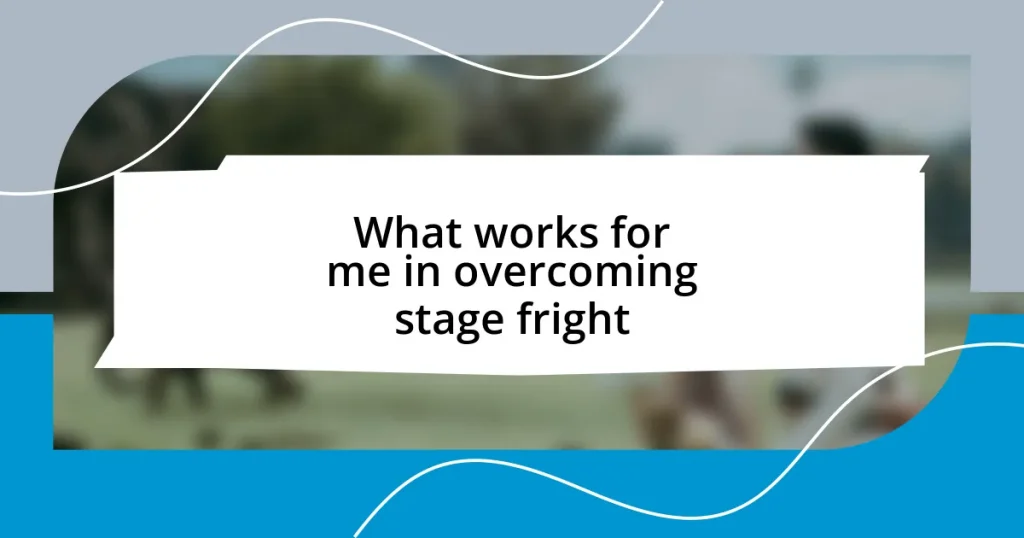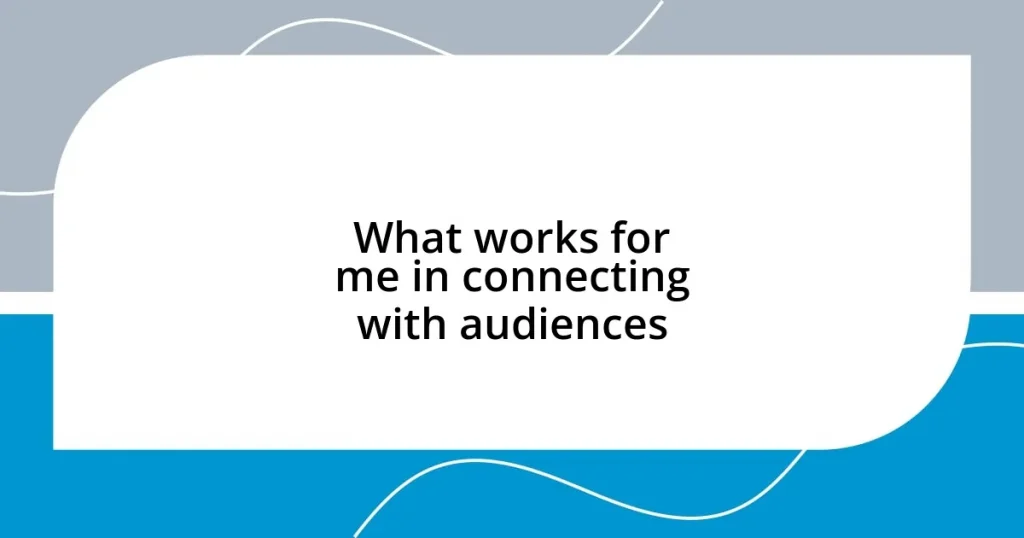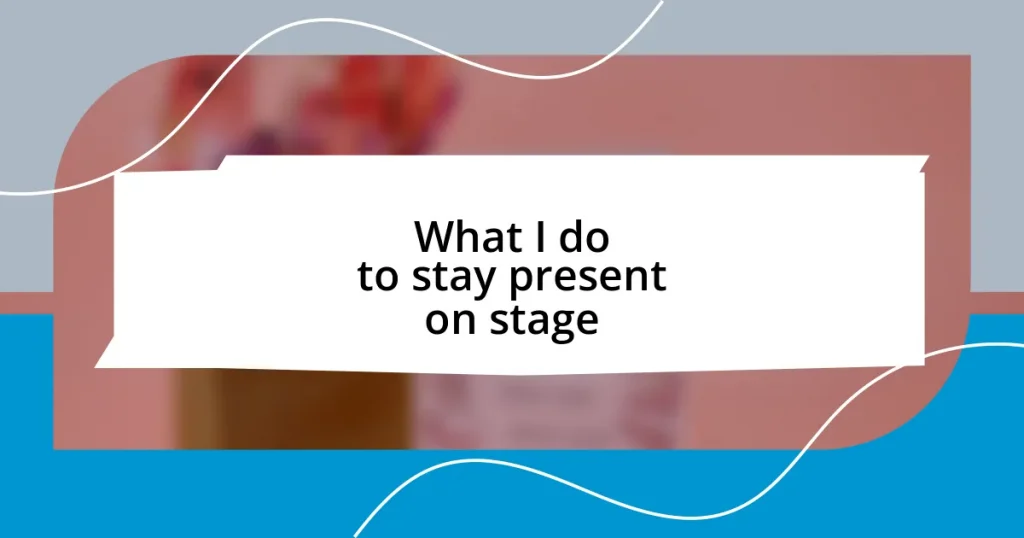Key takeaways:
- Stage fright is often caused by fear of judgment, perfectionism, lack of experience, and prior negative performances.
- Techniques like deep breathing, visualization, and positive affirmations can help manage performance anxiety effectively.
- Preparing thoroughly, including rehearsal and familiarization with the audience, can significantly reduce nervousness before performances.
- Seeking professional support, such as therapy or support groups, can provide valuable tools and encouragement to overcome stage fright.
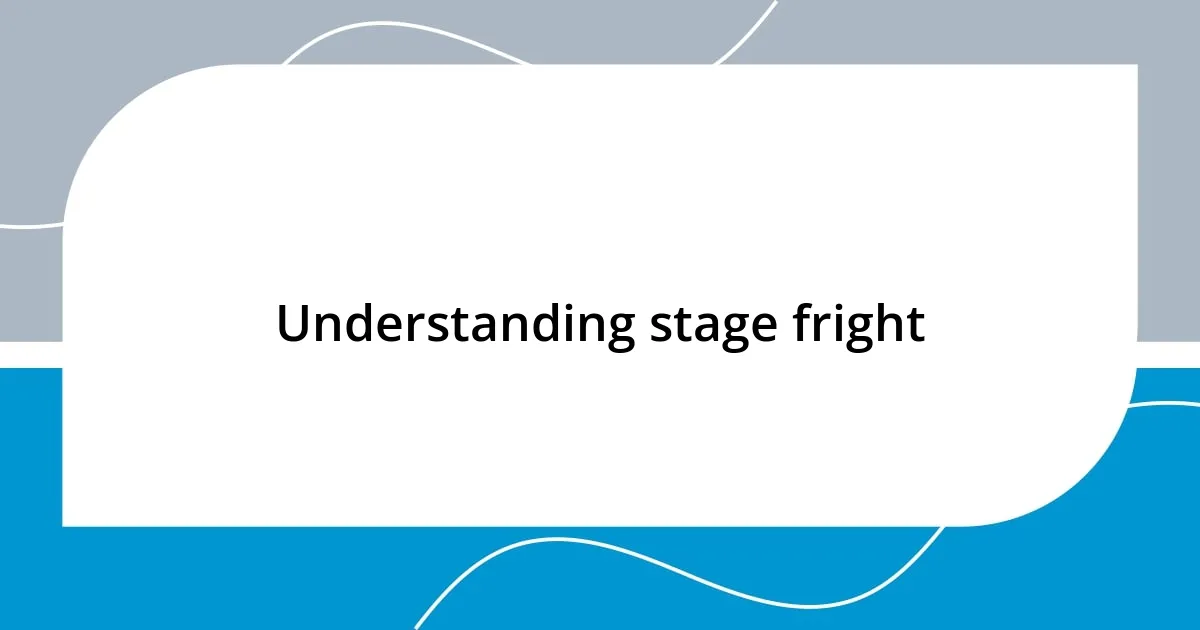
Understanding stage fright
Stage fright, or performance anxiety, is something many of us grapple with, often manifesting as a rush of nervous energy just before stepping into the spotlight. I remember the first time I performed in front of an audience; my heart raced, and my palms felt clammy as if they were holding the weight of my fears. How is it that such moments can turn the most confident individuals into anxious wrecks?
What I’ve learned is that stage fright comes from a complex interplay of physiological and psychological factors. When the audience’s gaze feels like a spotlight, it triggers our body’s fight-or-flight response, making even the most experienced performers feel vulnerable. I often question, what if we could shift that anxiety into excitement? Reframing those jitters could be the key to transforming our fear into something more manageable.
It’s important to recognize that stage fright can arise from various sources—fear of judgment, perfectionism, or even just the pressure to entertain. Reflecting on my own experiences, I’ve felt the sting of that fear, yet I’ve also discovered that sharing my vulnerabilities often resonates with the audience. Isn’t it fascinating how our struggles can connect us in ways we wouldn’t expect?
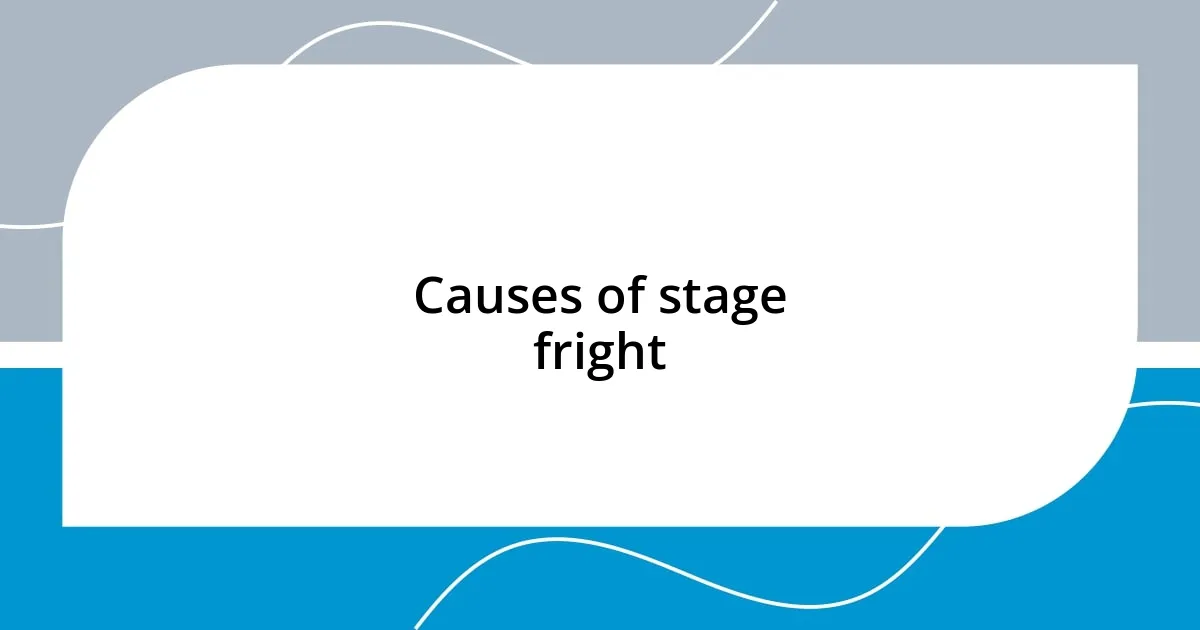
Causes of stage fright
Stage fright has its roots in a variety of factors, both internal and external. From my perspective, the fear of being judged or ridiculed is often at the forefront. I vividly remember a time when I trembled on stage, worrying relentlessly about what the audience thought of me. That moment made me realize how this fear can distort our sense of self-worth.
Several key causes contribute to stage fright:
– Fear of Judgment: Worrying about how others perceive us can be paralyzing.
– Perfectionism: The pressure to deliver flawless performances can create immense anxiety.
– Lack of Experience: Being new to performing can amplify nervousness.
– Previous Negative Experiences: A bad performance can linger in our minds and trigger anxiety.
– Overthinking: Dwelling on possible mistakes turns excitement into dread.
Understanding these causes helps me approach performances with a bit more empathy towards myself. It’s a reminder that even the most seasoned performers grapple with these feelings.
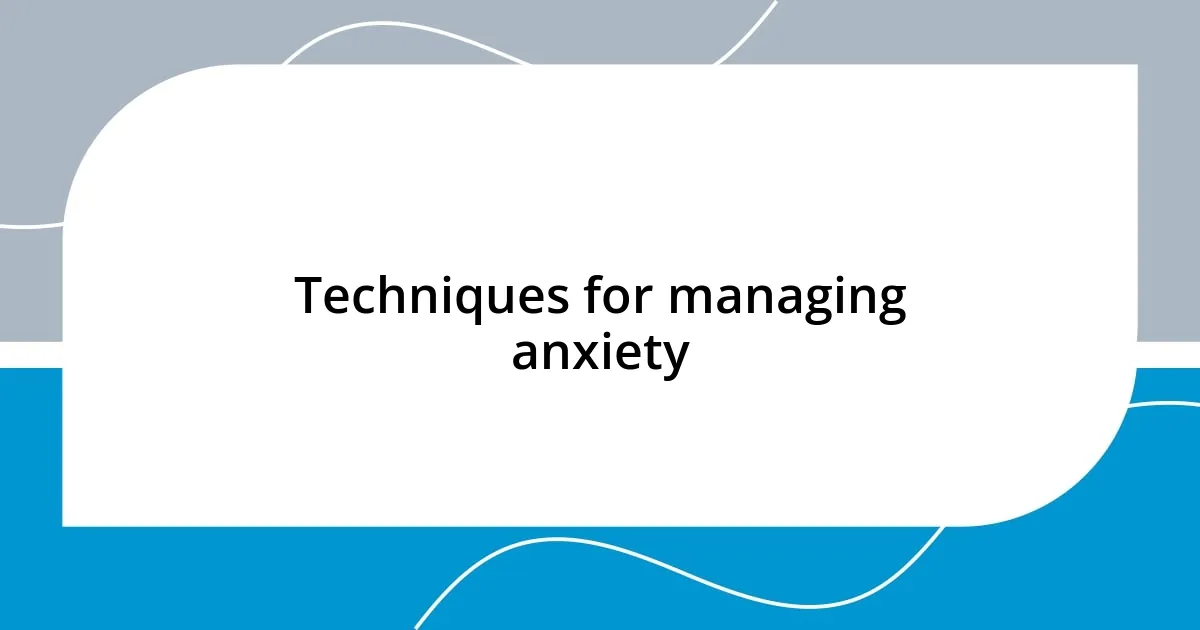
Techniques for managing anxiety
When it comes to managing anxiety, I’ve found that deep breathing techniques can work wonders. Taking slow, deliberate breaths not only calms my racing heart but also helps ground my thoughts. I often practice this just moments before going on stage, finding that it centers me in a way that diminishes the churning anxiety in my stomach.
Another powerful technique is visualization. I vividly imagine stepping onto the stage, radiating confidence as I engage with the audience. It’s remarkable how this simple exercise can reshape my mental landscape, allowing me to trade fear for excitement. I remember a time when visualizing success transformed my perspective entirely; I could almost feel the warmth of the audience’s support.
Lastly, I incorporate positive affirmations into my routine. Phrases like “I am prepared” or “I am capable” have become my mental mantras. Embracing these affirmations allows me to shift my focus away from negative self-talk. On days when self-doubt creeps in, recalling these affirmations brings clarity and reassurance, making the stage feel like a more welcoming space.
| Technique | Description |
|---|---|
| Deep Breathing | Calms the body and mind by focusing on slow, controlled breaths. |
| Visualization | Creates a mental image of success and confidence before performing. |
| Positive Affirmations | Encourages a shift in mindset through empowering self-talk. |
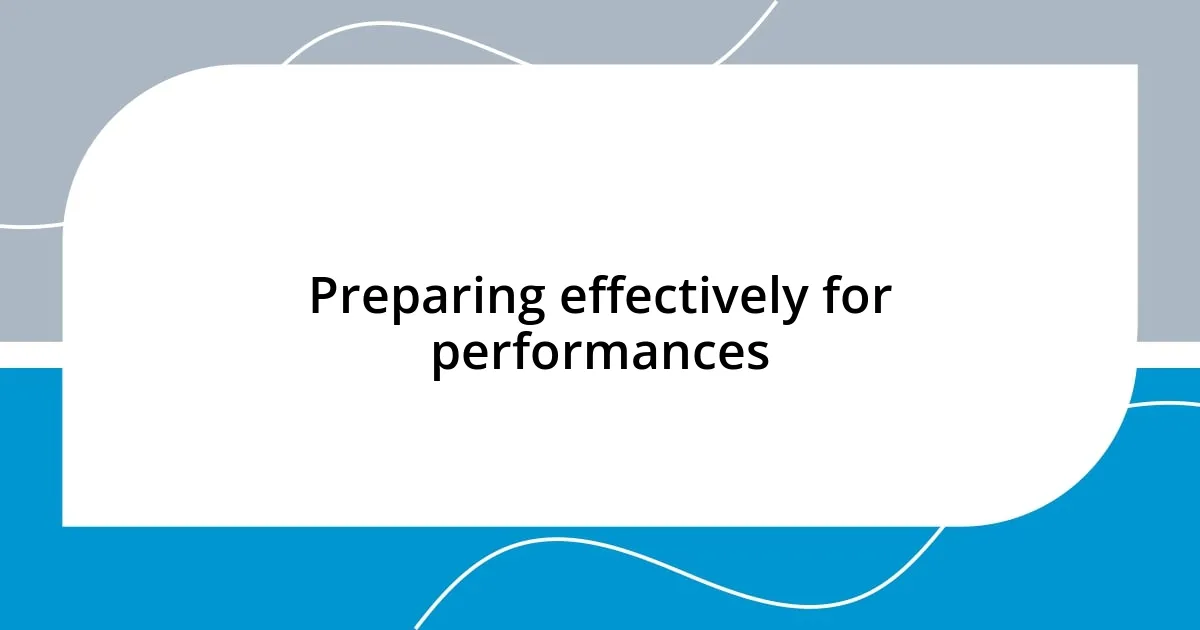
Preparing effectively for performances
When preparing for a performance, I’ve found that developing a solid routine makes all the difference. For me, this means rehearsing not just my material but also envisioning the entire performance environment. I often ask myself, “What will I wear? How will I feel as I step onto the stage?” By mentally walking through these steps, I create a sense of familiarity that reduces the element of surprise—and I really believe that enhanced familiarity can ease those pesky nerves.
Incorporating warm-up exercises into my preparation has also been incredibly beneficial. I remember a particularly nerve-wracking performance where I decided to stretch and vocalize prior to taking the stage. It was amazing how these simple actions not only loosened my body but also prepped my mind for what was to come. This hands-on approach transforms the overwhelming anticipation into something much more manageable.
Lastly, I can’t stress enough the importance of knowing my audience. Reflecting on who will be there and even engaging in light conversations with some audience members before the show has helped me feel more at ease. Have you ever noticed how sharing a smile or a laugh can instantly create connection? That rapport makes me feel less like a performer on display and more like a storyteller sharing a moment with friends, which really shifts the dynamics for me.
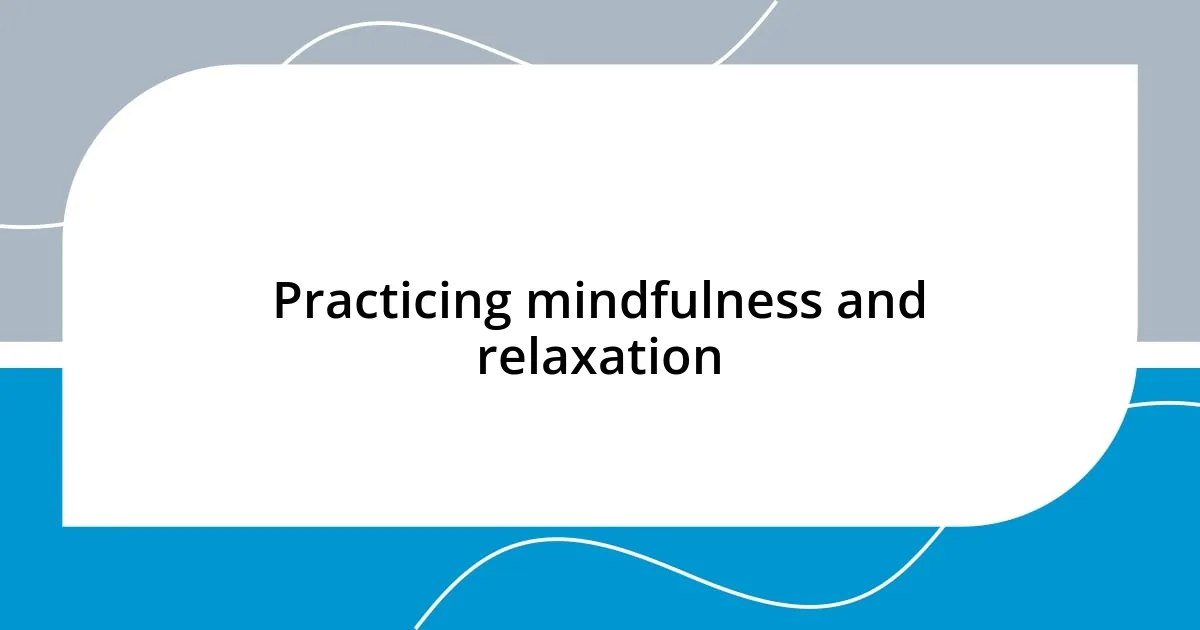
Practicing mindfulness and relaxation
Practicing mindfulness has become essential for me in overcoming stage fright. I remember the first time I stepped on stage and felt the weight of a million eyes on me. The adrenaline rush was overwhelming, but when I focused on being present—really tuning in to my surroundings—that’s when everything shifted. Mindfulness allowed me to savor the moment rather than dread it, turning nerves into an exhilarating experience.
Relaxation techniques are another crucial component of my routine. I often find a quiet space before a performance, closing my eyes and listening to the sounds around me. Whether it’s the rustle of the audience settling in or the hum of lighting equipment, grounding myself in those sounds helps create a bubble of calm. Has there ever been a moment for you when breathing in the present chased away the chaos? For me, it’s almost magical how those few minutes can transform pre-performance jitters into serene focus.
One of my favorite practices is progressive muscle relaxation. I recall a particularly stressful evening where my palms were clammy and my heart raced uncontrollably. As I systematically tensed and relaxed each muscle group, I gradually felt the tension melt away. By the time I stepped on stage, I was not just performing; I was fully engaged in the experience, feeling connected to the audience. This transformation has taught me that with the right mindfulness and relaxation techniques, I can truly embrace and enjoy the spotlight.
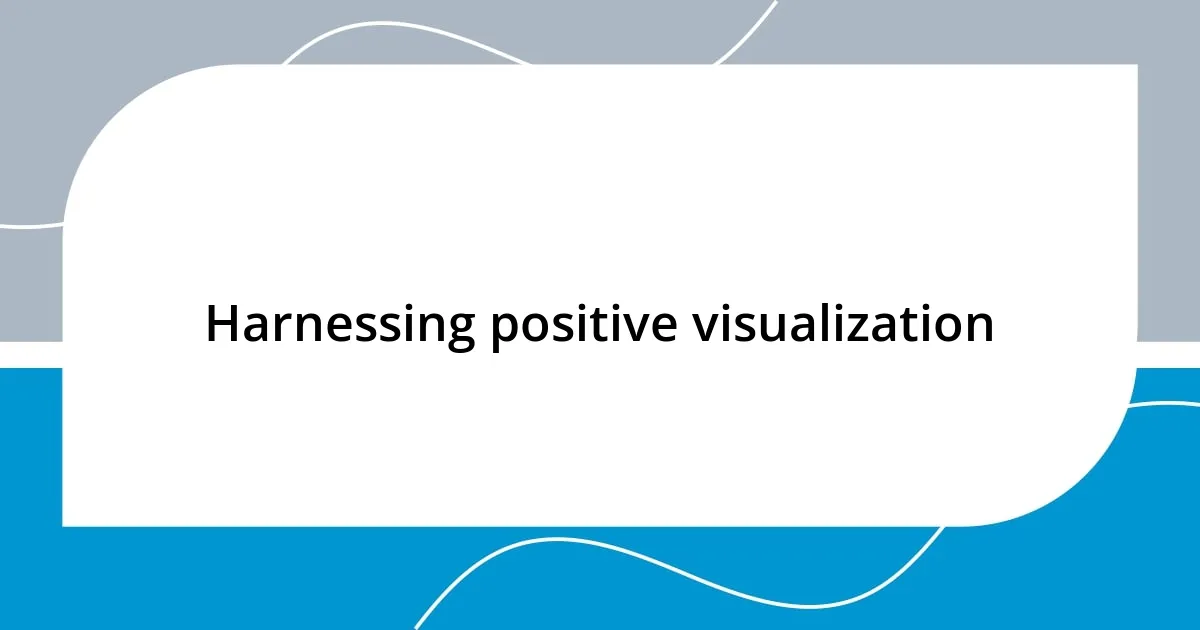
Harnessing positive visualization
Harnessing positive visualization has been a game changer for me. Before each performance, I take a moment to close my eyes and picture the scene in vivid detail. I imagine myself stepping onto the stage, my heart steady, and the audience’s smiles encouraging me. What would happen if you could see your success before it happens? I firmly believe that this mental rehearsal builds confidence and prepares me for the moment.
I often recall a time when I stood backstage, feeling the familiar knot of anxiety tightening. Instead of succumbing to it, I visualized the applause and warmth of an appreciative audience. Those images transformed my fear into excitement. It’s incredible how harnessing the power of positive imagery can shift our mindset; it becomes a tool for embracing the performance rather than fearing it.
This practice has deep emotional roots for me. When I was preparing for a particularly significant event, I imagined how proud I would feel afterward, regardless of the outcome. That changed everything. Have you ever had a moment where envisioning the future changed your perspective on the present? For me, visualizing success doesn’t just ease my nerves; it lights a fire within me, propelling me to excel and connect on stage.
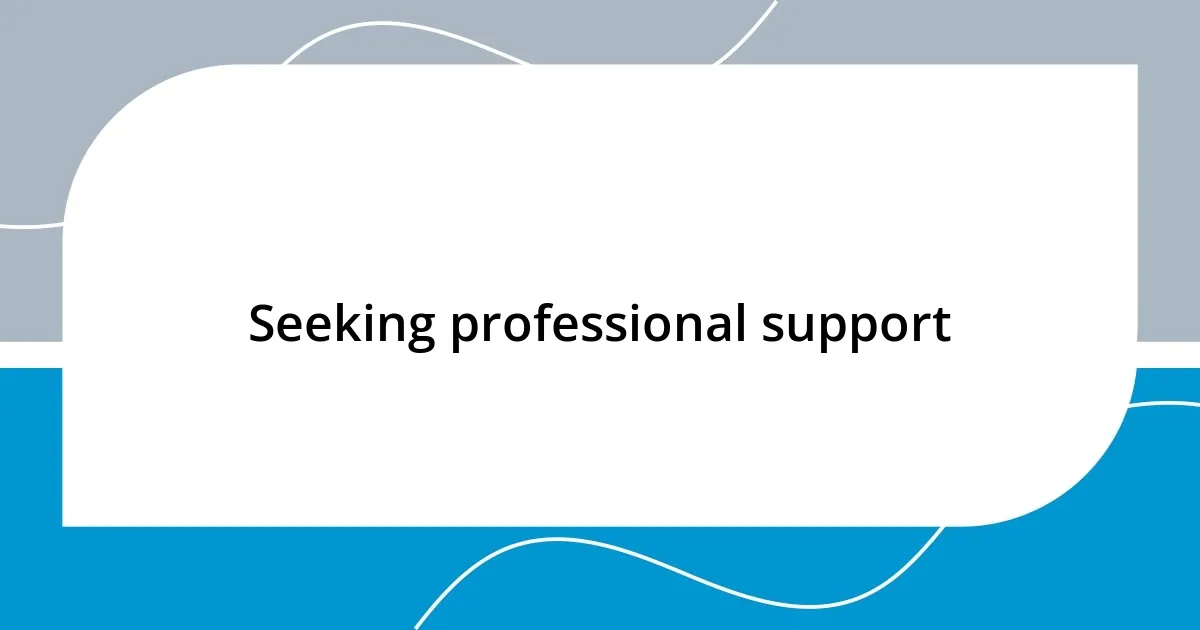
Seeking professional support
Seeking professional support can be a significant turning point in managing stage fright. I remember when I decided to explore therapy, thinking, “Why not talk to someone who can really help?” So, I found a therapist experienced in performance anxiety. We unpacked my fears, identifying triggers that I had overlooked for years. It was a relief to realize I wasn’t alone in this journey.
In addition to individual therapy, I also considered joining a support group. Sharing my experiences with others facing similar challenges offered surprising comfort. We would practice speaking in front of one another, celebrating small victories together. Have you ever noticed how powerful it is to feel understood? That feeling created a safe space that bolstered my confidence and inspired me to keep pushing forward.
Working with a professional has allowed me to develop tools tailored to my specific needs. One technique I still use is cognitive-behavioral strategies to reframe my thoughts before stepping on stage. When those anxious thoughts creep in, I remind myself of the progress I’ve made and the support I have behind me. Making the decision to seek help was one of the best choices I ever made to confront my stage fright head-on, and I can’t recommend it enough.


